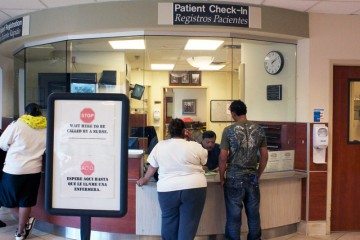Coleman and Janek Debate Responsibility over State’s Uninsured

After nearly two hours of testimony in the House Public Health Committee Wednesday, committee members finally got to the crux of the battle over the uninsured when state Rep. Garnet Coleman, D-Houston, pressed Dr. Kyle Janek, executive commissioner of Health and Human Services, on the state’s responsibility to its uninsured.
In past testimony, Janek has followed the line of Governor Perry in saying that an expansion of Medicaid under the Affordable Care Act would be like “pouring more money into a broken and unfixable system.” Instead, Janek has said he would focus on strengthening Texas’ safety net, by channeling more of the uninsured to the state’s teaching hospitals.
But every year, the state puts up less funding to compensate hospitals for treating the uninsured. Instead, the responsibility has increasingly fallen to local taxpayers to the point that some local governments want to secede from Texas.
In August, George Hernandez, president and CEO of University Health System in San Antonio, which runs the indigent program in Bexar County, made national headlines after he proposed that Texas’ six most populous counties band together to circumvent the state and apply for the federal Medicaid expansion money on their own.
Coleman pointed out the glaring gap in state medical funding on programs such as the Disproportinate Share Hospital Program, or DSH, which reimburses hospitals that treat the uninsured. The program’s funding includes a state-federal match. “When was the last time that the state wrote a check for bring down this [cost of DSH] in 25 years?”

Patients check in at the Brackenridge Hospital emergency room in Austin. Jen Reel
Janek chuckled. “I know you don’t really ask questions you don’t already know the answer to,” he said to Coleman. “I think that when we count the state hospitals, the state owned hospitals, some of that money goes in there. But in terms of the real money, [that] is not state money. [It is] local money.”
Coleman responded: “Who has the responsibility for Medicaid? What entity has the responsibility for Medicaid?” Janek avoided the question with a joking reply, and Coleman pressed his point.
“So this is a state responsibility … The challenge is that the revenue that used to go into hospital districts has declined, and they’re getting only people without a [Medicaid] reimbursement. So they truly are the safety net without benefit from Medicaid patients …”
Coleman continued. “That ought to be a component when we talk about this so that people understand that hospital districts are having a problem, and they’re having a money problem …This should be showing up. There’s no doubt about it.”


